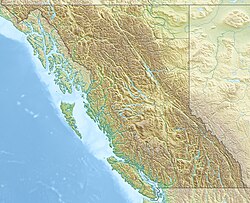| Mount Freshfield | |
|---|---|
| Highest point | |
| Elevation | 3,337 m (10,948 ft) [1] [2] [a] |
| Prominence | 477 m (1,565 ft) [1] [2] |
| Parent peak | Mount Barnard (3340 m) [1] [2] |
| Listing | |
| Coordinates | 51°44′34″N116°56′45″W / 51.74278°N 116.94583°W [5] |
| Geography | |
| Country | Canada |
| Provinces | Alberta and British Columbia |
| Protected area | Banff National Park |
| Parent range | Park Ranges [1] |
| Topo map | NTS 82N10 Blaeberry River [5] |
| Climbing | |
| First ascent | 1902 J. Norman Collie; James Outram; H.E.M. Stutfield; G.M. Weed; H. Woolley; C. Kaufmann; Hans Kaufmann [3] [1] [6] |
Mount Freshfield straddles the Continental Divide marking the Alberta-British Columbia border in Canada. It was named in 1897 by J. Norman Collie after Douglas Freshfield. [3] [1]


